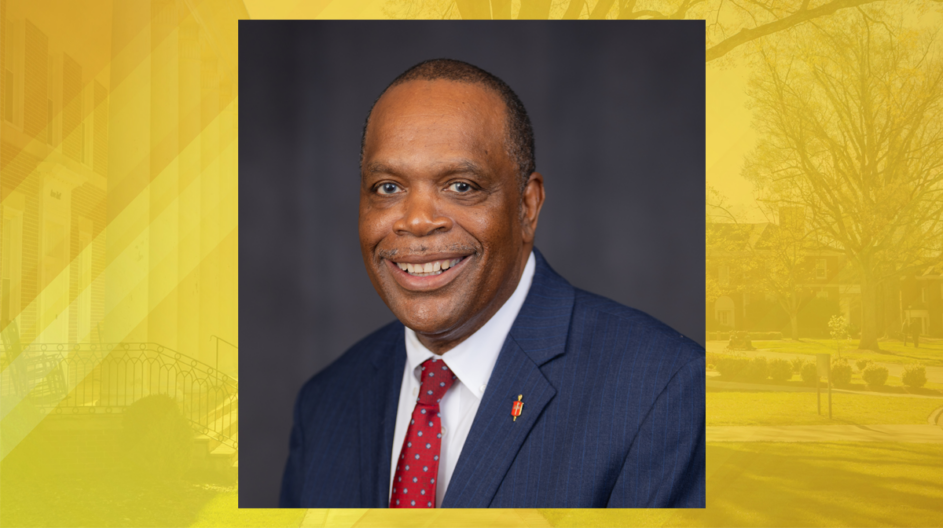
Alumnus’ Path from Pastor to Bishop Paved at Pfeiffer
This past September, Bishop Leonard Fairley, a 1981 graduate of Pfeiffer College, became the Resident Bishop of the South Carolina Annual Conference of The United Methodist Church (UMCSC), which includes 714 chartered churches. He had held two similar positions since 2016, serving as the Resident Bishop of the Louisville Area and, then, as the Interim Bishop for the Raleigh Episcopal Area.
Fairley’s principal duties in South Carolina range from determining which ministers should fill openings in the conference’s churches to helping iron out problems that arise in various congregations. He also aims to cast a vision for the United Methodist Church in South Carolina, and he aspires to be a calm, prayerful leader of the church who “embodies humble leadership and reminds United Methodists in South Carolina that they have been called to serve, not to be served.”
Fairley’s journey to UMC leadership has included pastoring churches, mainly in the North Carolina Conference, and it has included joining Mission Work Teams in Costa Rica, Jamaica, Montserrat, Zimbabwe, Haiti, and the Appalachia Service Project.
Along the way, family has been Fairley’s rock: He was married to Priscilla Ann Russell until her death in 2013. In January 2018, God answered a prayer for new love, and in September of that year, Fairley married Dawn Sparks. Dawn had lost her soulmate, Rev. David Sparks, in 2015. Between them, Bishop Fairley and Dawn have four adult children and 11 grandchildren.
A graduate of Duke Divinity School, Fairley grew up in Laurinburg, N.C., contending with what he called “extreme poverty” before becoming the first member of his family to attend college. Several people he knew encouraged him to consider attending Pfeiffer, including Statha Gilliam-Osborne ’77, a Pfeiffer alumna who taught music at Scotland High School in Laurinburg when he was a student there. As Fairley looked over the Pfeiffer catalogue in Scotland’s guidance office, he sensed that the College would be a good fit for him.
“I was intrigued by it basically because it was a liberal arts school and because it was small,” he said. “I knew that that would be helpful to me; I didn’t want to get lost in a bigger school. I wanted to find a smaller school where the environment was nurturing and supportive and encouraging and affirming. And Pfeiffer became that for me.”
Pfeiffer also became “transformative” for Fairley, albeit in ways he didn’t originally anticipate. He said his grandmother Gladys “was sure that God was calling me into some form of ministry. She never said what, but she always reminded me of that.” Initially, however, Fairley didn’t enroll at Pfeiffer with the goal of becoming a pastor, much less a church leader; instead, he envisioned pursuing a pre-law major that would lay the groundwork for a career as an attorney.
Because of Pfeiffer’s liberal arts focus, though, Fairley also took required courses in subjects such as religion and English, and these “began to reaffirm in me what my grandmother would always tell me, and I’m eternally grateful for that.” They also nurtured his love of writing, which would come to complement his work for the United Methodist Church. Who Shall Hear My Voice?, a 2009 collection of his poems, aims to illuminate “God’s voice speaking” in a variety of ways.
In time, Fairley switched his major to religion and philosophy and set his sights on a career in the United Methodist Church. He also took full advantage of the residential life of Pfeiffer, a UMC-related institution, rooming with Reverend Bart Milleson ’80, a now-retired UMC pastor. Fairley’s conversations with Milleson, which continue to this day, helped awaken his interest in becoming a minister.
Milleson also invited Fairley to accompany him to a UMC district gathering, where Milleson would get a kind of head start on his future career by meeting with a committee on ordained ministry. Fairley saw himself following in Milleson’s footsteps: “It was just another one of those inspirational steps that led me to the United Methodist Church.”
Lots of factors determine who is leadership material in UMC circles. For Fairley, one “has a lot to do with faith and trust and being willing to allow others to affirm who you are, to see things in you that you could not see in yourself.”
“People like that in my life have always been important, including people at Pfeiffer,” he said.
Fairley cited another factor: a willingness to change, to “die to” or let go of “certainty, as we see it.”
“If we’re going to be collaborative or we’re going to be connectional, we have to be willing to listen to others,” he said, explaining how he approaches his work at the conference. “And we have to be willing to confess and admit when we were wrong.”
This way of thinking began to take hold in Fairley when he took a course on philosophy at Pfeiffer that was taught by the late Rev. Dr. Philip Pharr ’61, also an ordained United Methodist minister. Pharr assigned a paper on why the sun rises, promising an A grade to anyone who answered that question correctly.
“Everybody wrote all these beautiful things about the way the sun rises and all that stuff,” Fairley said. “And I did the same thing.”
After reading through all the papers, Pharr indicated that everyone had missed the mark. He reminded them, as Fairley recalled, that “the sun doesn’t rise. The Earth rotates.’”
Fairley believes these lessons – in critical thinking, connection and perspective – are among many that he learned during his Pfeiffer education, and they have been the foundation of his ministry.
This article was written for Pfeiffer University by Ken Keuffel.